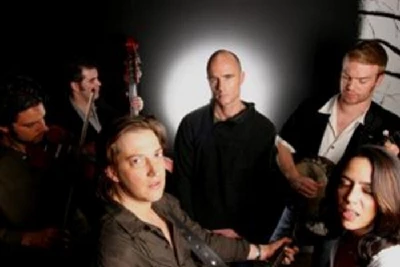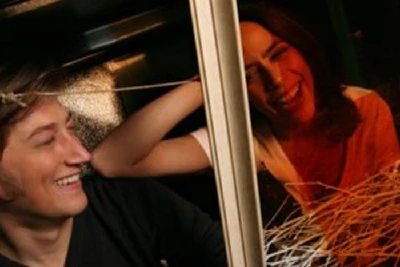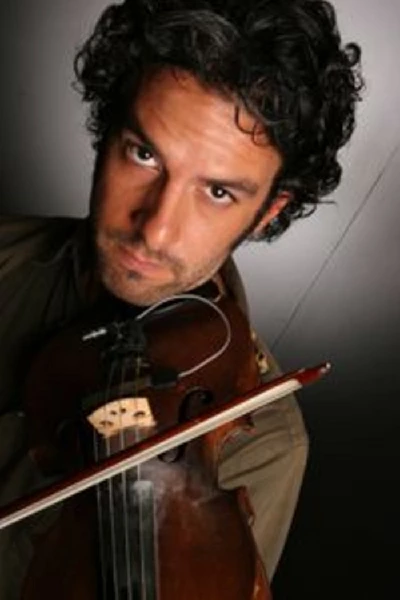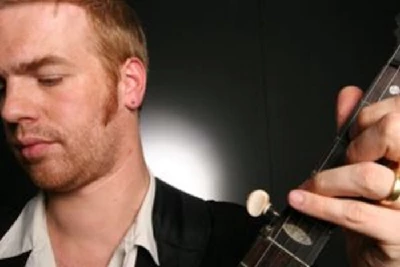published: 1 /
4 /
2005

London alt. rockers Viarosa have just released their debut Ep 'Porous' and have an album on the way. Frontman Richard Neuberg talks to John Clarkson about the influence his one-time Catholic faith and personal tragedy has had on his songwriting
Article
Of all the major branches of Christianity, the Catholic faith is possibly the most colourful. It is a religion of the senses, of the aural, the visual and the emotional.
While Catholic churches and cathedrals’ exteriors dominate their landscapes and are architecturally sumptious towers of devotion to God, their interiors are generally equally luscious and usually glorious montages of lavish stained glass windows, devotional paintings of Mary and blood-and-guts statues of the crucified Christ. Catholic masses are similarly extravagant testimonies of faith, involving much pealing of bells and incense-burning, and have a strong theatrical emphasis on ritual and ceremony.
The confession box holds a dramatic power over its converts. Catholic dogma, its focus more perhaps than any other religion on damnation and salvation, is such that it continues to hold a hypnotic allure, even on those who have chosen to abandon it.
Richard Neuberg, the frontman with Viarosa, is one such figure. He is a lapsed Catholic and an atheist. It has been many years since he rejected his former religion, yet even now it has a sway. His songs and his lyrics are steeped in and empowered with Catholic imagery.
“I was brought up a Catholic” he tells Pennyblackmusic. “My Dad wasn’t a Catholic. He was a refugee from Germany. My Mum is though. Even if one gives up its beliefs there are certain things there that means that there is still a structure inside oneself of salvation and redemption.”
“It is only recently that I have got back into the habit of going back to church sometimes with my Mum. I don’t mind going now, but for a while I thought it was all total rubbish and wouldn’t go. Now I go and I feel that there is a symbolism there and in a way I am missing something. In terms of purpose though I guess that the closest I have come to religion is with music.”
Neuberg, who is now in his mid 30’s, first began writing music and playing in bands in his native London in the late 80’s and early 90’s. He was romantically involved with Justine Frischmann, who would go on to front Elastica, but the relationship ended when she began her much-publicised liaison with Suede’s Brett Anderson. The then rising Britpop movement, however, had direct little appeal to Neuberg, and disillusioned by its whimsies and the collapse of his relationship with Frischmann, he came close to abandoning music altogether. There was a five year period in the mid 90’s during which Neuberg suffered from chronic fatigue syndrome that he didn’t do any songwriting at all. As he began to recover from his illness, however, towards the end of that decade, he started to take inspiration from the alt. country movement in America and took up writing again.
“I was raised on a lot of acoustic music” he recalls. “I listened to people like John Martyn and Nick Drake from an early age. Joni Mitchell is the musical love of my life in some ways. In the 90’s there was a lot of music that I didn’t really relate to, particulary from Britain. It just didn’t feel right. A friend started to introduce me to Richard Buckner and stuff like that, and I felt that there was an immediate connection there, I guess a kind of acoustic core that I had got a bit detached from. It just reminded me of myself really. It was a comfort that there were people doing that. It is soul in a kind of way.”
“I am not saying that there is not any soul in many of the Britpop bands and acts like Oasis and Blur, and I am not saying either that their music doesn’t come from real feeling because a lot of it does. It doesn’t inspire me personally though. I have got a slightly more melancholy soul I think, and I get more comfort from more melancholy music. It is as simple as that really.”
Viarosa formed in 1999 when Neuberg, who plays acoustic guitar and sings in the group, began playing music with his friend, violinist Josh Hillman. The group soon expanded to also include former Cornershop drummer Nick Simms ; second vocalist Emma Seal ; mandolin and banjo player Rob McHardy and electric and stand up bassist Mick Young. Viarosa’s five song debut EP, Porous’, came out in late April. Their first album, ‘Where the Killers Run’, is due out in June.
The lyrics of the ‘Porous’ EP find Neuberg in spiritual torment.On the first two songs, the title song and ‘Where the Killers Run’, he is trapped in mental anguish.Two of the latter songs, ‘Call to Arms’ and ‘Wake’, however, point towards redemption and hope for the future. Its music runs a similar gauntlet of moods, from stark acoustic rusticity on ‘Porous’, which finds Neuberg accompanying himself with just a guitar : to 60’s Robert Wyatt/Canterbury-style choral folk on ‘Call to Arms’, to swirling dark country blues on both ‘Where the Killers Run’ and ‘Wake’.
It is embedded with religious imagery. The opening couplet on ‘Porous’ of “Hold me like I’m made of holes/Pouring in and falling out/I’m porous”, as the ‘Whisperin’ and Hollerin’ website has pointed out in an early review, recalls images of a broken Christ being pulled down from the cross. Elsewhere ‘Where the Killers Run’ has a severely depressed Neuberg telling himself to “plea/beg for forgiveness/pray to be released”, while on the more optimistic ‘Wake’ a “dear light” beckons out.
“It’s funny” laughs Neuberg. “I have got a lot of friends who aren’t involved in music. They find listening to Viarosa’s music difficult because socially I am pretty upbeat and then they hear me doing this kind of stuff.”
“If you decipher some of my lyrics, they are all about feeling persecuted. There is a real persecution complex there even though in my daily life I am relatively well balanced. It is like I feel I am being hunted down. It is an oppressive super ego thing. It is a landscape I feel, a barren landscape. There is this thing in the church about suffering and salvation, and I guess unfortunately to some extent that is my thing also.”
Perhaps not surprisingly, given the fact that he has called Viarosa’s debut EP ‘Porous’. much of the language of Neuberg’s songs is very rich. Kings, soldiers and canons are all common reference points, and some of his lyrics are medieval in tone and sound.
One track, ‘A Poor Man’s Prayer’, which will appear on the album and which Neuberg describes as “feudal blues”, tells of a group of tenant landowners who are both chased away from and murdered for their land by “cutters.” It is in fact set in the Middle Ages, but draws parallels with Neuberg’s other lyrics about oppression and persecution.
“I think that is true” says Neuberg when asked if the lavishness of his lyrics could also be tied to his former religion. “Words are very important to me. Poetry is important really. It is one of the great things about music that it can so often be combined with language. I guess that language is a religious thing as well. That is one of the beauties of old language in particular.”
While the Catholic church has been a dominant influence, two other factors, both personal tragedies, have also had a massive bearing on Neuberg’s work, and have contributed to much of its melancholy.
“My father died when I was young and then so did my sister” he says reflectively. “She actually commited suicide. I guess that those two things were the most formative things that ever happened to me. I am not sure what sort of person I would be now, especially if my sister hadn’t died.”
“It was an existential nightmare that threw me a lot, and I think probably contrbuted to my illness. I was 19, 20 and still with Justine at the time. There are some songs on the album directly about that. It was something of a struggle to survive for a while.”
“I get a lot of comfort in music. My sister and I used to play a lot of music together. I feel I am able to keep a connection with her through it. There is a lot of catharsis in that.”
With the EP already out, and the album forthcoming, Viarosa hope now to tour and to play as many shows as possible. Some of its members, however, are jobbing musicians and also play in other bands. Josh Hillman tours regularly with the Willard Grant Conspiracy, while Nick Simms also drums for Natacha Atlas. Although Viarosa played a short tour in support of Robyn Hitchcock just before Christmas last year, this has inevitably put some restrictions on the group.
“It is sometimes hard” Neuberg acknowledges. “But we manage. If things do start taking off for us, there is a lot of commitment in the band. It is a difficult balance, but we’re pretty accustomed to it. We are a good live group, and we all enjoy playing live.”
After all the hardships of the past, the devestating turmoil of the premature losses of both his father and his sister, his battle against illness, and his long years spent in the musical wilderness, Neuberg is now looking optimistically towards the future.
“We are planning to record another album in the autumn” he enthuses in conclusion. “We’ve got a lot of material. We would love to do really well with Viarosa. We would love to go on support. We would love to do anything really.”
Although he has left, if not totally abandoned his former religion, music is proving to be Richard Neuberg’s spiritual redemption.
Picture Gallery:-



